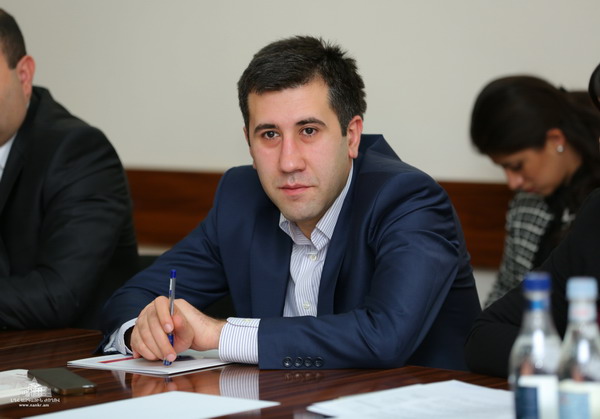The Armenian Weekly’s Exclusive Interview with Artsakh Ombudsman Ruben Melikyan
On March 9, Artsakh (Nagorno-Karabagh) Ombudsman (Human Rights Defender) Ruben Melikyan met with the editors and staff of the Hairenik Weekly and Armenian Weekly newspapers, as a part of his tour of the Eastern United States.
On March 9, Artsakh Ombudsman Ruben Melikyan met with the editors and staff of the Hairenik Weekly and Armenian Weekly newspapers, at the Hairenik headquarters in Watertown, Mass.
Upon entering the doors of the Hairenik headquarters in Watertown, Mass., the Ombudsman immediately felt a sense of familiarity. “I always feel like I’m at home when visiting Armenian institutions,” Melikyan said, admiring a historic photo of a delegation of the First Republic of Armenia visiting Massachusetts in 1919.
Melikyan is no stranger to the Boston-area. An alumnus of Tuft University’s Fletcher School of Law and Diplomacy Tavitian Program, he spent quite a bit of time in what he calls his “second favorite” city, back in 2008.
Read also
Since May 2016, Melikyan has lived in Stepanakert after he decided to take the job as the small nation’s Human Rights Defender—a decision, he says, was very easy to make.
At the Hairenik, Melikyan candidly spoke about his responsibilities, the challenges he faces, and his prospects for the future of Artsakh. He also detailed the importance of the Armenian Diaspora and the role it can play in Artsakh.
“One of [Artsakh’s] main advantages is the Armenian Diaspora—Spyurk. From the very beginning, I started to find ways to cooperate with the Diaspora by working with various different groups within it. I’m open to cooperate with any group, for the sake of the people of Nagorno-Karabagh and for the sake of human rights,” he explained.
According to Melikyan, one of the biggest problems in the Artsakh conflict is the lack of international presence there, mostly because of its unrecognized status. “For political reasons, some may not recognize the reality—not recognize Nagorno-Karabagh as the independent country it is. But no one can deny people,” Melikyan said.
“There’s a new type of discrimination that we face, one that is not connected to skin color or language, but connected to the political status of the country. Artsakh cannot be discriminated against for that… We are strong enough to do anything, but it is vital to bring the international community to Artsakh,” he added.

























































